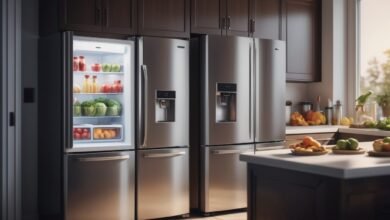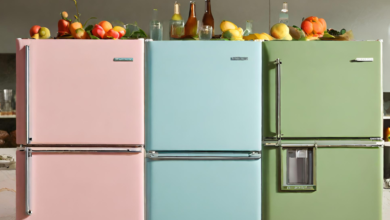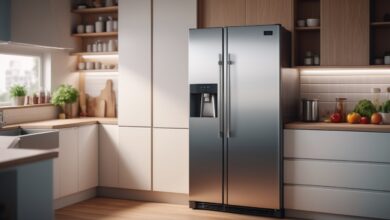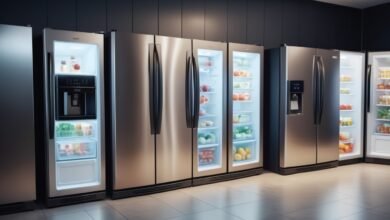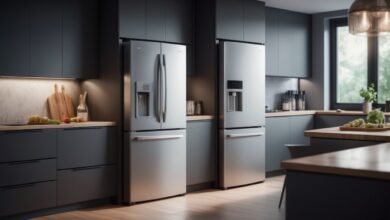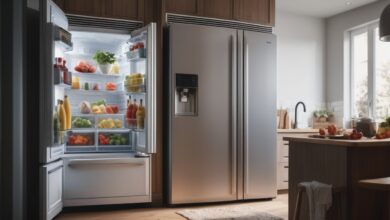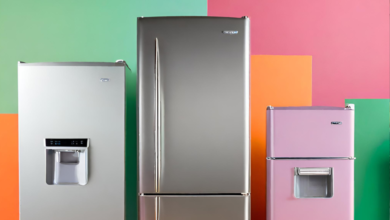Top-Rated Eco-Friendly Refrigerators: A Comprehensive Guide
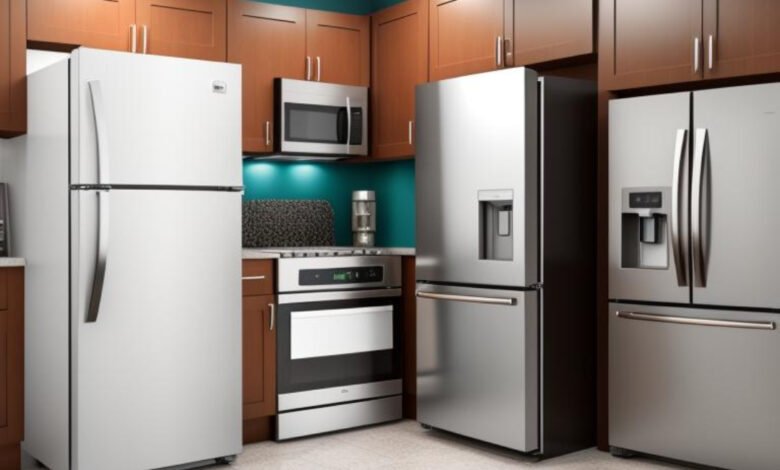
As the world embraces sustainability and environmental consciousness, eco-friendly appliances are gaining popularity, and refrigerators are no exception. Consumers today are not only looking for top-notch performance and features but are also seeking appliances that align with their commitment to reducing their carbon footprint. In this extensive guide, we explore the top-rated eco-friendly refrigerators that combine cutting-edge technology with environmental responsibility. From energy efficiency to sustainable materials, these refrigerators are leading the way in green appliance innovation.
The Importance of Eco-Friendly Refrigerators
Before delving into the top-rated eco-friendly refrigerators, it’s essential to understand why eco-friendliness matters in the realm of kitchen appliances.
1. Energy Efficiency:
Eco-friendly refrigerators are designed with advanced technologies that maximize energy efficiency. This not only lowers electricity bills for consumers but also reduces overall energy consumption, contributing to a greener planet.
2. Reduced Carbon Emissions:
Energy-efficient refrigerators emit fewer greenhouse gases, helping combat climate change. By choosing an eco-friendly refrigerator, consumers play a role in reducing carbon emissions and environmental impact.
3. Sustainable Materials:
Many eco-friendly refrigerators are built with sustainable materials, promoting responsible sourcing and manufacturing practices. This consideration extends the lifespan of the appliance and minimizes its environmental footprint.
4. Innovative Cooling Technologies:
Modern eco-friendly refrigerators often feature innovative cooling technologies that maintain optimal temperatures with minimal energy consumption. This not only preserves food better but also contributes to overall sustainability.
Top-Rated Eco-Friendly Refrigerator Brands
Let’s explore the top-rated eco-friendly refrigerators from brands that have demonstrated a commitment to environmental sustainability.
1. Samsung – Energy-Efficient Innovations
Overview:
Samsung is a leader in the electronics and appliance industry, and its commitment to sustainability is reflected in its range of eco-friendly refrigerators.
Key Features:
- Digital Inverter Compressor: Samsung refrigerators often feature a digital inverter compressor that adjusts its speed based on cooling demands, enhancing energy efficiency and reducing noise.
- Twin Cooling Plus: This technology maintains optimal humidity levels in the refrigerator, preserving food freshness without the need for excessive energy consumption.
Sustainable Practices:
- Eco-Friendly Refrigerant: Samsung uses eco-friendly refrigerants that have a lower environmental impact, contributing to the reduction of greenhouse gas emissions.
- Energy Star Certification: Many Samsung refrigerators are Energy Star certified, meeting strict energy efficiency guidelines set by the U.S. Environmental Protection Agency (EPA).
2. LG – Green Initiatives and Innovation
Overview:
LG is known for its innovative designs and cutting-edge technology, and the brand is actively involved in green initiatives, making its refrigerators a choice for eco-conscious consumers.
Key Features:
- Linear Compressor: LG refrigerators often incorporate an inverter linear compressor that enhances energy efficiency and reduces wear and tear.
- Smart Cooling Plus: This technology maintains optimal temperature and humidity levels, ensuring food stays fresh longer.
Sustainable Practices:
- Recyclable Materials: LG emphasizes the use of recyclable materials in its refrigerator construction, minimizing environmental impact.
- Energy Star and CEE Ratings: Many LG refrigerators are Energy Star certified and meet the Consortium for Energy Efficiency (CEE) standards, ensuring high energy efficiency.
3. Whirlpool – Sustainable Manufacturing
Overview:
Whirlpool, a long-standing player in the appliance industry, is committed to sustainable manufacturing practices, making their refrigerators an eco-friendly choice.
Key Features:
- Adaptive Defrost: Whirlpool refrigerators often feature adaptive defrost technology that reduces energy consumption by defrosting only when necessary.
- Accu-Chill™ Temperature Management: This system ensures precise temperature control, optimizing energy usage.
Sustainable Practices:
- Eco-Friendly Insulation: Whirlpool utilizes eco-friendly insulation materials in its refrigerator construction, enhancing energy efficiency.
- Sustainable Packaging: Whirlpool is known for its commitment to sustainable packaging practices, reducing waste throughout the product lifecycle.
4. GE Appliances – Green Initiatives and Energy Efficiency
Overview:
GE Appliances, a subsidiary of Haier, incorporates green initiatives into its product design, offering energy-efficient and environmentally responsible refrigerators.
Key Features:
- Advanced Filtration Systems: GE refrigerators often feature advanced water and air filtration systems, promoting the freshness of stored items and reducing the need for frequent replacements.
- Customizable Storage: Many GE models come with adjustable shelving and flexible storage options, allowing users to optimize space and minimize energy waste.
Sustainable Practices:
- Eco-Friendly Refrigerants: GE Appliances prioritizes the use of eco-friendly refrigerants that have lower global warming potential.
- Energy Star Certification: Many GE refrigerators are Energy Star certified, reflecting their commitment to energy efficiency and environmental sustainability.
5. KitchenAid – Energy-Efficient Luxury
Overview:
KitchenAid, a premium brand under the Whirlpool Corporation, brings luxury and energy efficiency together in its line of eco-friendly refrigerators.
Key Features:
- Preserva® Food Care System: KitchenAid refrigerators often feature the Preserva® system with dual evaporators for precise temperature and humidity control.
- LED Lighting: Energy-efficient LED lighting enhances visibility while minimizing energy consumption.
Sustainable Practices:
- Eco-Friendly Insulation: KitchenAid uses environmentally friendly insulation materials, contributing to the overall energy efficiency of its refrigerators.
- Quiet Operation: Prioritizing a serene kitchen environment, KitchenAid appliances are designed for quiet operation, minimizing unnecessary energy consumption.
6. Sub-Zero – Premium Sustainability
Overview:
Sub-Zero, synonymous with luxury, doesn’t compromise on sustainability. Its refrigerators are designed to deliver premium performance while minimizing environmental impact.
Key Features:
- Dual Refrigeration System: Sub-Zero is known for its dual refrigeration system, providing precise control over temperature and humidity for optimal food preservation.
- Air Purification: Many Sub-Zero models incorporate air purification systems, ensuring the freshness of stored items without relying on excessive energy usage.
Sustainable Practices:
- Energy-Efficient Compressors: Sub-Zero utilizes energy-efficient compressors that contribute to reduced energy consumption.
- Long Lifespan: Sub-Zero refrigerators are designed for durability, with a longer lifespan, reducing the need for frequent replacements.
7. Bosch – Precision Engineering and Sustainability
Overview:
Bosch, known for precision engineering, extends its commitment to sustainability in its line of eco-friendly refrigerators, offering a perfect blend of performance and green features.
Key Features:
- VitaFresh Technology: Bosch refrigerators often feature VitaFresh technology, optimizing temperature and humidity levels to extend the freshness of fruits and vegetables.
- Quiet Operation: Bosch prioritizes quiet operation, making use of advanced insulation and sound-dampening technologies.
Sustainable Practices:
- Energy Efficiency: Bosch refrigerators are known for their energy-efficient designs, contributing to lower utility bills and reduced environmental impact.
- Eco-Friendly Materials: Bosch incorporates eco-friendly materials in its refrigerator construction, emphasizing sustainability throughout the product lifecycle.
#
- Viking – Professional-Grade Sustainability
Overview:
Viking, synonymous with professional-grade appliances, brings sustainability into the realm of high-performance refrigerators, catering to consumers who demand excellence in both performance and eco-friendliness.
Key Features:
- ProChill Temperature Management: Viking refrigerators often feature ProChill temperature management, providing precise control over cooling conditions for optimal food preservation.
- Spacious Interiors: The refrigerator design includes spacious interiors, accommodating a variety of food items with ease.
Sustainable Practices:
- Commercial-Inspired Design: Viking refrigerators boast a commercial-inspired design, featuring robust construction and high-quality components for long-term reliability.
- Energy-Efficient Compressors: Viking utilizes energy-efficient compressors, contributing to reduced energy consumption and environmental impact.
Conclusion
Choosing an eco-friendly refrigerator is a significant step toward a sustainable and environmentally conscious lifestyle. The top-rated brands mentioned in this guide, including Samsung, LG, Whirlpool, GE Appliances, KitchenAid, Sub-Zero, Bosch, and Viking, have demonstrated their commitment to environmental responsibility through a combination of innovative technologies, energy efficiency, and sustainable practices.
As consumers, it’s crucial to consider individual preferences, budget constraints, and specific green features when selecting an eco-friendly refrigerator. Whether you prioritize energy efficiency, sustainable materials, or advanced cooling technologies, these top-rated brands offer a diverse range of options for those looking to make a positive impact on the planet while enjoying the benefits of cutting-edge refrigeration technology.
